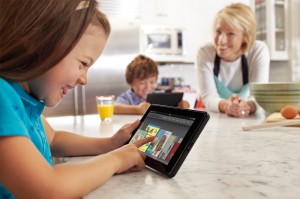Kindle is second-best selling tablet
 So says IHS iSuppli, which released projections for fourth-quarter tablet shipments on Friday. The firm predicts Kindle Fire will take about 13.8 percent of the market after having no share in the previous quarter. Kindle Fire went on sale at the end of September, with Amazon taking preorders right away but shipping November 14.
So says IHS iSuppli, which released projections for fourth-quarter tablet shipments on Friday. The firm predicts Kindle Fire will take about 13.8 percent of the market after having no share in the previous quarter. Kindle Fire went on sale at the end of September, with Amazon taking preorders right away but shipping November 14.
iSuppli expects Amazon to ship about 3.9 million units during the quarter, taking second place and all but tripling Samsung tablet market share. Kindle Fire's success comes at the expense of Apple as well as Samsung, however.
While iSuppli predicts Apple will hold the top spot, its share will drop 4.1 points to 65.6 percent. Samsung also takes a considerable hit, falling three points to 4.8 percent of the market. Despite the disruption, Kindle Fire's success will contribute to an overall increase in tablet shipments of 7.7 percent during the quarter.
"Nearly two years after Apple rolled out the iPad, a competitor has finally developed an alternative which looks like it might have enough of Apple’s secret sauce to succeed", iSuppli tablet research head Rhoda Alexander says. "Initial market response strongly suggests that Amazon, with the Kindle Fire, has found the right combination of savvy pricing, astute marketing, accessible content and an appropriate business model, positioning the Kindle Fire to appeal to a brand-new set of media tablet buyers".
Indeed any competitor looking to have any success against the iPad must have exactly what Alexander says: appeal to new buyers. Apple and Samsung have some of the most loyal customers, so marketing to this set is not going to win a new entrant much.
The drop in market share is likely less consumers switching from their Galaxy Tabs and iPads to the Fire, but more so new tablet consumers entering into the market at an affordable price: $199.
Amazon's pricing creates problems for its fellow Android brethren though, Alexander argues. "Most other Android tablet makers must earn a profit based on hardware sales alone. In contrast, Amazon plans to use the Kindle Fire to drive sales of physical goods that comprise the majority of the company’s business", he explains. "As long as this strategy is successful, the company can afford to take a loss on the hardware, while its Android competitors cannot".
This willingness to be a "loss leader" puts pressure on the entire industry at large, especially now that a bargain-priced tablet is enjoying so much success at retail. Who will be the first to respond? That remains to be seen.
